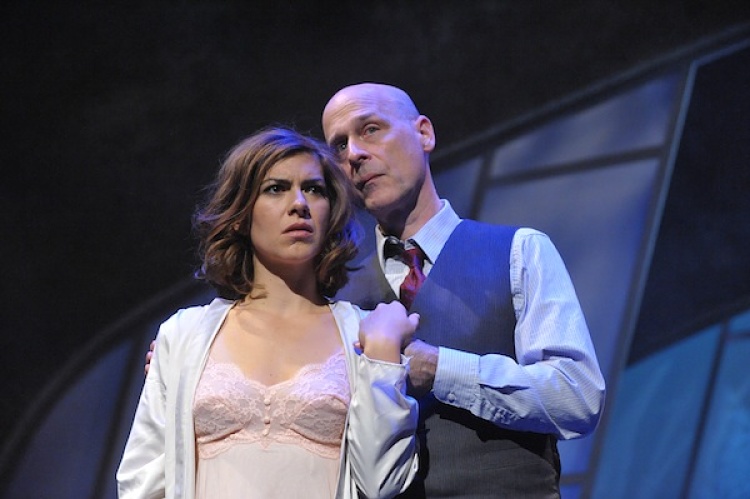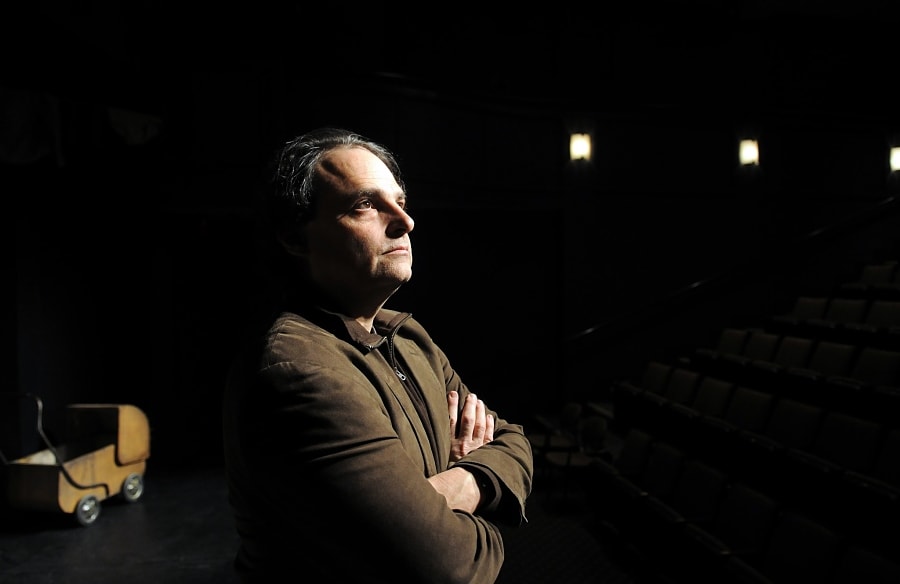Ari Roth, longtime artistic director of Washington, D.C.’s Theater J, was fired from his post last week after long-simmering tensions with the theatre’s board. This story from our February 2012 issue goes into depth about the mission and purpose behind Roth’s programming for the theatre, as well as recounting some of the controversies it stirred. —The Editors
Maybe it’s the temperature, maybe it’s the politics—but there’s something about plays from the Middle East. Ask Ari Roth, artistic director of Theater J in Washington, D.C., who has produced more plays from that region than any other theatre artist in America. Roth can attest that the dialogue in plays from this part of the world is “more scalding than subtle. But that’s good, arresting theatre.”
Heated dialogue has become a Theater J trademark, both during the plays and at post-show talkbacks. A focus on Israel and the Middle East is one surefire way to attract passionate audiences (and occasional detractors). Since taking the helm of Theater J in 1998, Roth has been as avid about producing work that engages with Israeli life, culture and politics as he has about producing plays about American Jewish life.
He’s addressed the Middle East on Theater J’s main stage as well as in a reading series he began in 2000, “Voices from a Changing Israel,” designed as a forum for discussion about Israeli culture and politics as well as a way to test plays before moving them to the main stage. Roth’s programming choices in the series have willingly embraced provocative subjects and stoked controversy on more than a few occasions.
The series began with British playwright David Hare’s Via Dolorosa, based on his experiences with Arabs and Jews on a visit to Israel; another early entry was Israeli playwright Motti Lerner’s play The Murder of Isaac, which grappled with the 1995 assassination of Prime Minister Yitzhak Rabin.
Both were bold choices—Hare’s piece because it was a left-leaning piece by an outsider, and Lerner’s not just because of its raw subject matter but because, as Roth admits, his first attempt to introduce Lerner’s work to D.C. audiences had been a flop. In his inaugural year, Roth offered Lerner’s Exile in Jerusalem—one of the worst-selling productions in Theater J’s history. According to Roth, it lacked the “political immediacy” his audience was looking for. In the fall of 2000, however, with the second intifada raging, The Murder of Isaac successfully connected with patrons hungry for theatre that looked unblinkingly at the conflict.
Alongside this new series, Roth also founded the Peace Cafe with Theater J council member Mimi Conway and friend Andy Shallal—another venture to get people talking about Middle East issues and to find common ground between Jews and Arabs, in this case between bites of falafel. Shallal joined Theater J’s council the following year as the first and only Arab member—a presence that has encouraged Palestinian advocates to take a seat at the table.

It’s not all Israel all the time at Theater J, which is situated within D.C.’s Jewish Commnity Center. True, its productions all tap into Jewish identity in some way—but Jewish theatre, like Jewishness, is an elastic concept. Theater J’s interpretation is broad, including plays by Jewish writers that don’t have specific Jewish content (Arthur Miller’s After the Fall, for example) and, conversely, plays by non-Jewish writers that do (like Matthew Lopez’s The Whipping Man); both of these plays are part of Theater J’s current mainstage season. Predictably, the audience demographic is largely Jewish, though the theatre does draw a diverse crowd.
The “Voices” series and the MiddIe East focus is a strong part of the Theater J mission—and it has tested the outer limits of (and even gone beyond) Jewish identity. By the mid-2000s, in a post-9/11 world where the West was purportedly at war with Islam and the Israeli peace process was in a state of total collapse, Roth felt the increasing need to include Arab points of view. In 2007, he changed the series title to “Voices from a Changing Middle East,” and embraced work that focused on Palestinians, Iraqis and other Arab populations. This new incarnation of the “Voices” series opened the door to plays like Noor, by Dr. Akbar Ahmed, the story of a kidnapping within a modern Muslim family; Caryl Churchill’s intensely controversial Seven Jewish Children; and Lerner’s Benedictus, about the Iranian nuclear threat. “Voices” also continued to present evocative Israeli plays like Iris Bahr’s harrowing solo show Dai.





